AN EVENING WITH MICHAEL CARD
I want to tell you that we have the brand new Matthew: The Gospel of Identity commentary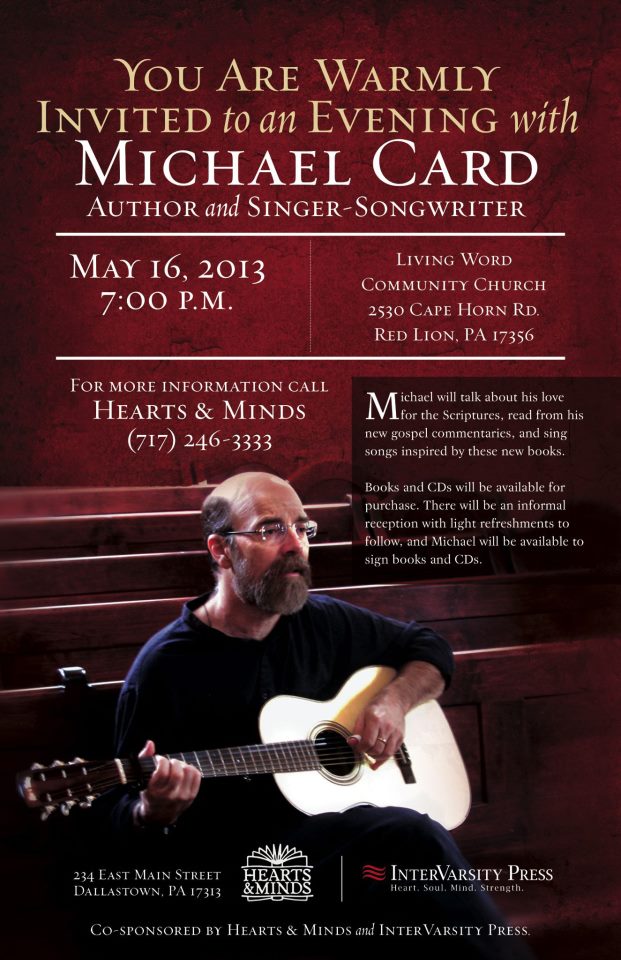 by classy/casual acoustic musician (and smarty-pants author) Mr. Michael Card, published in very handsome paperbacks by the excellent InterVarsity Press (regularly priced at $18.00.) We have it (and other books by Mr. Card) on sale and if you write to us before Thursday, we can get you an autographed one, at our sale price, too. Yep, we’ll do our best to score you an autographed copy on Thursday.
by classy/casual acoustic musician (and smarty-pants author) Mr. Michael Card, published in very handsome paperbacks by the excellent InterVarsity Press (regularly priced at $18.00.) We have it (and other books by Mr. Card) on sale and if you write to us before Thursday, we can get you an autographed one, at our sale price, too. Yep, we’ll do our best to score you an autographed copy on Thursday.
Why Thursday, you ask? We are sponsoring a talk by Michael here, where he will tell us about the Biblical Imagination Series he’s been doing, lecture or read a bit from the new Matthew volume, and play some music inspired by the gospel texts. Thanks to near-by friends at Living Word Community Church in Red Lion who are partnering with us to host Michael for this author appearance, book signing, and mini-concert. As we are in our 30th year of doing this bookselling thing, we are honored to have such a high caliber musician turned author gracing us, and glad for the on-going support of LWCC. Learn more about the “Evening with Michael Card” here.
However, even if you are not in the area, you should know about Card’s latest project, this “Biblical Imagination” series of books and recordings. I hope you enjoy my ruminations on his significance and the features of his latest work.
CCM AND THE BIBLICAL CLARITY OF MICHAEL CARD
Depending on your age and faith culture, you may know that Michael Card penned classic pop songs like “Love Crucified Arose”, “Known By the Scars”, the lovely “El Shaddai” made famous by Amy Grant and the still popular “Joseph’s Song” which you probably heard on the radio this past December.
Back in the 80s and 90s, what I sometimes call the “early-middle period” of contemporary Christian music, there were some really dumb acts, artists with shallow theology and cheesy production. The mimicking of any hot trend was incessant and the reputation of the industry was somewhat of an embarrassment. Some CCM stuff was terrible. Yet, there were artists we enjoyed and some whose records remain among my all time favorites. From the Lost Dogs to Rich Mullins, the 77s and The Choir (and, of course, the late great Mark Heard) there were edgy, vital artists who did an enduring body of artful work Some CCM stuff was brilliant.
A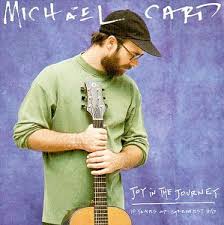 nd then there was Michael Card. Card wasn’t a cheap entertainer or a glitzy musical evangelist, but he never tried to be an avant garde, new wave (or any wave) heady, cryptic artiste, either. He was faithful at doing what he did well: theologically-literate, story-songs about Biblical texts. He worked overtime getting an MDiv in Biblical studies, being mentored in the details of exegesis by the remarkable New Testament scholar William Lane. And he used his notable song-writing abilities to take Bible stories and turn them into soft-rock, often acoustic tunes which sometimes had a nearly hymn-like feel. With soft instrumentation, using everything from harps to banjos, solo piano or finger-picked acoustic guitar, he has created a body of work including over 30 albums and he has won oodles of awards, from Grammy’s to Dove’s. He has done a remarkable series of songs based on the Old Testament, another set on the life of Jesus. He’s done children’s music and he’s done a collection of hymns. I have appreciated his songs, and enjoyed his shows more than once. And once, I got to experience his graciousness and integrity first hand.
nd then there was Michael Card. Card wasn’t a cheap entertainer or a glitzy musical evangelist, but he never tried to be an avant garde, new wave (or any wave) heady, cryptic artiste, either. He was faithful at doing what he did well: theologically-literate, story-songs about Biblical texts. He worked overtime getting an MDiv in Biblical studies, being mentored in the details of exegesis by the remarkable New Testament scholar William Lane. And he used his notable song-writing abilities to take Bible stories and turn them into soft-rock, often acoustic tunes which sometimes had a nearly hymn-like feel. With soft instrumentation, using everything from harps to banjos, solo piano or finger-picked acoustic guitar, he has created a body of work including over 30 albums and he has won oodles of awards, from Grammy’s to Dove’s. He has done a remarkable series of songs based on the Old Testament, another set on the life of Jesus. He’s done children’s music and he’s done a collection of hymns. I have appreciated his songs, and enjoyed his shows more than once. And once, I got to experience his graciousness and integrity first hand.
MY HUTZPAH, CHINESE ASYLUM SEEKERS AND HIS GRACIOUSNESS
About twenty years ago, some of you recall, I was deeply involved in an intense local campaign trying to get political asylum for a large group of Chinese folks who had escaped their totalitarian regime, fleeing the forced abortion policies from their one-child-only repressive state, only to be detained by the INS (now ICE) in York, PA.
Michael had been to China, helped distribute Bibles to house churches there — learning first-hand how some of them were persecuted by the government, some of their leaders having been imprisoned, some of their homes burned down — and had a song called “So Many Books” which sang about our embarrassment of literary riches in light of this mission to China. (It is actually from an album based on texts from the Old Testament prophets, and this is from Amos 9.) I contacted him right before the show, asked if I could make an announcement about our need for assistance in this local legal project for Chinese dissidents, and suggested he could play that song as a set up for me to do my little spiel.
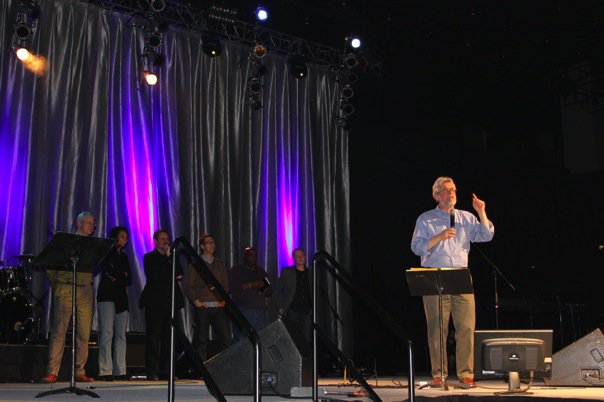
This was a large show in a classy auditorium, with a sizable stage and professional lighting and, looking back, I’m nearly embarrassed by my audacious hutzpah, inviting myself into his show. As I recall, he seemed delighted to allow me to share the stage with him, worked that song into his set, providing the artistic context for me (who he had never met) to talk about justice, asylum, detention reform, the need for prayer and protest of our government’s lack of fair trails for these dear folks. I knew it was remarkable that he cared enough to allow this to be part of his stage show, and his own professional courtesy belied a passion for justice and mission that was, especially back then, quite rare. Except for the occasional Compassion International or pro-life pitch, CCM artists in those days simply didn’t get involved in much. My admiration and respect for Michael, which was already high because of his Biblical and theological integrity, grew even more that night.
I write about it now, knowing we are bringing him in to speak this week, and wonder if he even remembers. I hope to thank him, once again, and tell him about how we kept at it for years and years, praying in front of the prison every week, forming the largest pro bono legal project in US history, and how some of our detainees got asylum so many years ago, and about some who were deported to further imprisonment, torture and death back in communist China. As his song puts it, we have so very many books and Bibles here, and such freedom. Some folks lives aren’t as privileged and we need to always keep that in mind. Anyway, it was a memorable thing for me to meet him and have our passions for this justice project affirmed.
I’ve noted that Mr. Card earned an advanced degree in Biblical studies and is on the deeper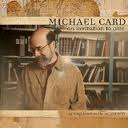 end of the CCM gene pool. A fairly recent remastered and re-issued double album of songs based all on the narrative of the Old Testament called An Invitation to Awe (Sparrow; $17.99) shows the artist not on stage or with his guitar, but in front of a library of Biblical reference books. Let’s face it: this is unheard of in the rock music industry and makes him either really geeky or out of the box cool. Did I mention that besides releasing over 30 albums, and doing album covers with books on ’em, that Card
end of the CCM gene pool. A fairly recent remastered and re-issued double album of songs based all on the narrative of the Old Testament called An Invitation to Awe (Sparrow; $17.99) shows the artist not on stage or with his guitar, but in front of a library of Biblical reference books. Let’s face it: this is unheard of in the rock music industry and makes him either really geeky or out of the box cool. Did I mention that besides releasing over 30 albums, and doing album covers with books on ’em, that Card
has himself written over 20 books? Even if he were not the beloved performing and recording artist that he is, he would be known as a significant writer, contributing much to the contemporary religious publishing world.
N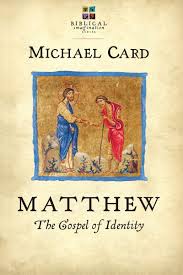 ot all, but most of his best books are on the well-respected InterVarsity Press. We thank them for helping us host him here this week as he talks about his brand new commentary on Matthew, in the Biblical Imagination series. It is called Matthew: The Gospel of Identity, IVP; $18.00 (see our sale price, below.) Doesn’t it have a fabulous cover design? The correlating album by the same name will arrive on Thursday (making us the very first place to have it, so our event will be a bit of a coming out party for the CD.) You can click on the link below and type in whatever you want to order — for BookNotes readers, we have these Michael Card items all at 20% off.
ot all, but most of his best books are on the well-respected InterVarsity Press. We thank them for helping us host him here this week as he talks about his brand new commentary on Matthew, in the Biblical Imagination series. It is called Matthew: The Gospel of Identity, IVP; $18.00 (see our sale price, below.) Doesn’t it have a fabulous cover design? The correlating album by the same name will arrive on Thursday (making us the very first place to have it, so our event will be a bit of a coming out party for the CD.) You can click on the link below and type in whatever you want to order — for BookNotes readers, we have these Michael Card items all at 20% off.
Allow me to briefly tell you about Michael’s latest book project, and then mention a few of his notable previous ones. We will have them all on sale Thursday night at our event. Let us know if we can get an autographed one for you. I think we can pull that off…
THE BIBLICAL IMAGINATION SERIES
Matthew: The Gospel of Identity IVP regularly $18.00
Mark: The Gospel of Passion IVP regularly $16.00
Luke: The Gospel of Amazement IVP regularly $18.00

In this handsome on-going series (the volume on John won’t come out until next year) Card has done the church and reading public a great service by distilling much academic scholarship, good, attentive study, and written informed, but readable commentaries. They are nearly unique insofar as they attempt to bring curiosity to the reading; his artistic temperament and imaginative sensibility colors how he reads the texts, so these are being touted as examples of the redemptive use of the imagination.
This is an immensely interesting idea, and the preface and introductory material are themselves wonderful meditations on this need and this approach. In different ways, in each one, he says that “the imagination is the bridge between the heart and the mind” or that we must “engage with Scripture at the level of the 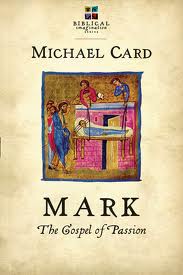 informed imagination.”
informed imagination.”
He notes, and is surely right, that there are those who are so rationalistic in their studious approach to the text that they are missing much. The mind alone simply cannot comprehend and know all that is being revealed in sacred Scripture — and anyone who has studied social history at all knows that this reductionist view of what counts as knowing is based on the pagan assumptions of secular Rationalism from the era pompously known as the Enlightenment. Of course, the other extreme is equally troublesome; mystical, allegorical, symbolic, emotional, and other creative readings can become unhinged, disconnected from common sense, overly subjective, not grounded in the best insights of the tradition of teaching that has gone before us or the perspectives of others in our faith community.
In other words, we 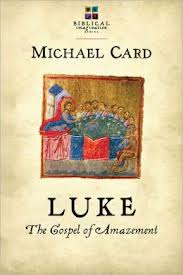 need some holy combination of right and left brains, of scholarly/rational approaches and of spiritual/meditative approaches. And Card tells us that our God-given imagination is the tool the Spirit uses to bring back together these two modes of knowing, modes designed to compliment one another but rendered asunder by the Fall and human sin. Card makes this assertion quite nicely in the prefaces of these commentaries.
need some holy combination of right and left brains, of scholarly/rational approaches and of spiritual/meditative approaches. And Card tells us that our God-given imagination is the tool the Spirit uses to bring back together these two modes of knowing, modes designed to compliment one another but rendered asunder by the Fall and human sin. Card makes this assertion quite nicely in the prefaces of these commentaries.
It is fabulous, I think, to have an author so self-aware and candid about his or her assumptions and strategies as they commence reading. (I was going to make a joke about him getting his cards on the table.) It is also quite nice to have one writing so helpfully about the proper role of the imagination. No lesser a thinker than modern painter and aesthetic writer Mako Fujimura, agrees, saying “Michael Card invites all of us to a magnificent journey of hesed (grace and mercy). This humble offering is a sweet aroma and an invaluable contribution to all those who desire to know the Bible and live creatively.”
As it says on the back cover of one of them,
For years Michael Card’s music has imaginatively explored the narrative power of the Word of God. Now, in the Biblical Imagination Series, Card invites readers to enter into the Scripture as he does, at the level of imagination… (these volumes) reintegrates our minds with our hearts to recapture our imagination with the beauty and power of Christ.
Here is a bit of a review published by the Englewood Review, of Luke: The Gospel of Amazement, which explains this nicely,
Card proves himself a worthy guide, offering much to be enjoyed by both
bookworms and bohemians as he walks us chapter by chapter through Luke.
For the former there is the requisite geographical and historical
information, the dabbling in the original languages, and the discussions
of authorship, setting, etc. For the latter there are plenty of
invitations to feel, see, and hear, along with the occasional reference
to music, painting, or art history. The author is particularly on point
when he gets us exploring by way of his compelling use of language.
Noteworthy examples are his discussions of the “unorthodoxy” of Jesus
and the “impossible demands” that Christ places upon his disciples.
These and other themes run throughout the book, giving us new nails on
which to hang our mental pictures of the architecture of Luke’s Gospel.
Or, hear what my friend David Swartz wrote at Patheos:
Michael Card wants to help us do something different with the Bible. With this (and
three volumes on the remaining Gospels, all from InterVarsity Press), he
wants us to uncork this rich book, letting it breathe until we drop our
jaws and defenses, and fall in love with the main character–Jesus
Christ. Michael finds his interpretive key in imagination. He helps us
revive it as something often lost in “growing up.” Card wants us to
smell the sweat of fishermen and sneeze on Galilean road dust. He wants
us to hear the tremble in screaming voices where panic threatens to
strangle hope as the blind cry out, “Jesus, Son of David, have mercy on
me!”
What makes these commentaries especially helpful is that they are very readable. While it isn’t quite as chatty and upbeat as Max Lucado — who is a fan, by the way — they are not dry or colorless. If one likes the entry-level commentary of writers like William Barclay or Warren Weirsbe or even the New Testament for Everyone set by N.T. Wright these would be quite accessible and, I think, enjoyable.
But what makes them even more special is that Michael Card is doing a record to go with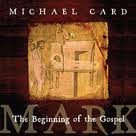 each book. I am not sure (and hope to ask him at our event) if the music came first and then the commentary, or if the songs emerged from his scholarly study. In some ways, the music could be commentary on the commentary, which sounds a whole lot like how First-Century rabbis would have taught, using midrash. Cool, huh? Anyway, I like these albums and even if you aren’t huge fans of CCM, you should know these recordings. I told a group of Presbyterian church educators just last week that I think they are useful in their own Bible classes and Sunday school teaching. Having this whole body of text-based Bible songs is a huge asset
each book. I am not sure (and hope to ask him at our event) if the music came first and then the commentary, or if the songs emerged from his scholarly study. In some ways, the music could be commentary on the commentary, which sounds a whole lot like how First-Century rabbis would have taught, using midrash. Cool, huh? Anyway, I like these albums and even if you aren’t huge fans of CCM, you should know these recordings. I told a group of Presbyterian church educators just last week that I think they are useful in their own Bible classes and Sunday school teaching. Having this whole body of text-based Bible songs is a huge asset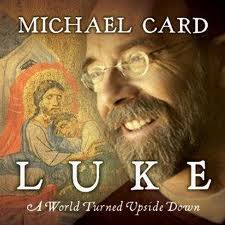 to
to
teachers and preachers.
For what it is worth, the artistic imagination aspect of all of this is subtle. These are not commentaries that overtly engage the senses (see Dwelling With Philippians a Conversation with Scripture in Image and Word by Elizabeth Steele Halstead, Paul Detterman and others [Eerdmans; $22.00] if you want that.) They are not particularly aimed at helping you meditate on the texts using spiritual disciplines such as lectio devina (try the Ancient-Future Bible Study Series published by Brazos or the Meditative Commentary on the New Testament published by Leafwood if you want that kind of a slow, contemplative reading experience.) Card isn’t pushing envelopes or arriving at bold new conclusions, either (see, for instance, Colossians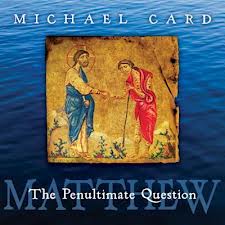 Remixed: Subverting the Empire by Walsh & Keesmaat [IVP; $23.00] if you want a wonderful example of fresh, relevant, provocative scholarship that does indeed push some envelopes.)
Remixed: Subverting the Empire by Walsh & Keesmaat [IVP; $23.00] if you want a wonderful example of fresh, relevant, provocative scholarship that does indeed push some envelopes.)
There are absolutely no flights of fancy here and if I have any criticisms of the “Biblical Imagination” project it is that they are not imaginative enough nor particularly courageous in offering a new way to write Bible commentaries. Mike is, I gather, careful, which is both a strength and a bit of a hindrance for this sort of a project. Occasionally the author playfully speculates, and when he does it is with humility and fruitfulness (his take on the role of Peter in Mark’s life and in his telling of the gospel is genius, although, admittedly, not fully original.) There are moments where he offers some very curious insights, and occasionally invites us to stop and ponder. Card is a teacher and writes with a pastors heart; he isn’t trying to be innovative, just helpful. He isn’t trying to make a name as an innovator, he is trying to open up the Scriptures so we can know God in Christ and live for fully for His sake. These commentaries are not at all odd, not artsy, not bohemian, not risky. They are just very nicely written, quite solid, somewhat creative reflections for ordinary readers. It is, I think, what many people hunger for.
If you are not one who does much Biblical study, or haven’t ever read a commentary straight through, any of these three would be an ideal introduction to this Christian practice. I hope you try one, and prayerfully read your way through it. Why not convene a group, inviting them to read the books, listen to the songs, week by week. It could be a great summer time.
LAMENT, SEERVELD AND THE SADNESS OF 9-11
I don’t know exactly how it went down, but the short version is this: one of my favorite authors and a bit of a long-distance mentor, the exceptionally astute and nothing-short-of-brilliant Biblical scholar and philosopher of aesthetics, Dr. Calvin Seerveld, contacted Card after the horrors and national sorrow of 9-11. As you know, many contemporary worship services call their musical worship leaders “praise teams.” Nearly one third of the Psalms are laments, and Seerveld wondered why there are no lament teams. He asked Card what he thought, challenging him to write some appropriate worship music of this sort. Seerveld insists that we simply must know how to receive and use these Biblical themes liturgically, and we need to — as Seerveld’s powerful chapter on learning to lament together in congregational worship in Forgotten Songs: Reclaiming the Psalms for Christian Worship edited by Ray Van Neste (B&H Academic; $19.99) puts it– “Learning to Cry in Church.” Interestingly, Michael was reading Walt Brueggemann’s The Prophetic Imagination (Fortress; $19.99) in that season, which talks much of these themes and the call from Seerveld convicted him.
Two books and a CD came from that challenge, and they are each very important.
S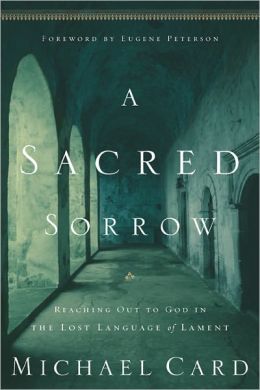 acred Sorrow: Reaching Out to God in the Lost Language of Lament (Navpress; $14.99) and The Hidden Face of God: Finding the Missing Door to the Father Through Lament (NavPress; $14.99.) We commend them both to you, and we will of course have them for sale Thursday night as well.
acred Sorrow: Reaching Out to God in the Lost Language of Lament (Navpress; $14.99) and The Hidden Face of God: Finding the Missing Door to the Father Through Lament (NavPress; $14.99.) We commend them both to you, and we will of course have them for sale Thursday night as well.
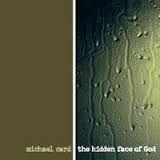
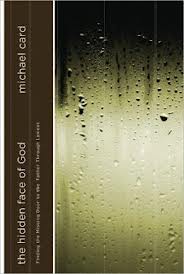
Michael also released an album to compliment The Hidden Face of God, a CD with the same title The Hidden Face of God (Discovery House; $12
.95.) It is, interestingly, a lovely album, not “hard to listen to” or particularly sad. It includes tender lyrics and while the songs are about hard times, seeking God even in God’s seeming absence, it is surprisingly graceful and beautiful. I sometimes wondered if it ought to have been more gritty and angry. It includes a nice version of “O Sacred Head Now Wounded” which is lovely, with a bit of Celtic whistle. Anyway, it’s a good one, quintessentially Card.
***
Michael Card has done more than two dozen other books. For instance, he has a lovely set of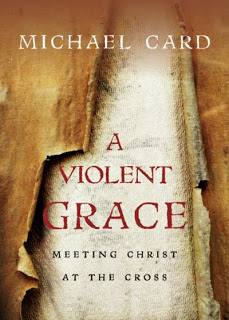 reflections on the gospel of John called Parable of Joy (Discovery House; $14.99) based on his own translation of the text. He has a truly outstanding collection of pieces about the cross A Violent Grace: Meeting Christ at the Cross (IVP; $15.00) which moved me deeply as I read some of them during Lent. It was out in a hardback before, but I really like the hand-sized paperback IVP released. There is a very popular book of his called A Fragile Stone: The Emotional Life of Simon Peter (IVP; $16.00) with which many people resonate — most of us should, come to think of it — and even a study guide for it. Each of these have supplemental albums of songs to go with them, and we stock them all. He really is a prolific author and artist, and we hope you have used some of his good resources.
reflections on the gospel of John called Parable of Joy (Discovery House; $14.99) based on his own translation of the text. He has a truly outstanding collection of pieces about the cross A Violent Grace: Meeting Christ at the Cross (IVP; $15.00) which moved me deeply as I read some of them during Lent. It was out in a hardback before, but I really like the hand-sized paperback IVP released. There is a very popular book of his called A Fragile Stone: The Emotional Life of Simon Peter (IVP; $16.00) with which many people resonate — most of us should, come to think of it — and even a study guide for it. Each of these have supplemental albums of songs to go with them, and we stock them all. He really is a prolific author and artist, and we hope you have used some of his good resources.
AND THEN THERE ARE THESE TWO AMAZING TREASURES
A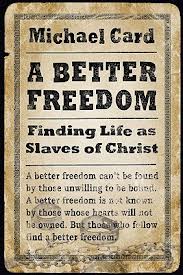 Better Freedom: Finding Life as Slaves of Christ (IVP; $15.00) This is one that has to be mentioned as it is truly extraordinary. (It isn’t every day I get to tell about a book where there is very little other work done in the field and this one is on a rare topic — wow!) A Better Freedom is a book which I’ve mentioned before and it is not only truly fascinating, it is brave. And painful. And wonderful. Card attends an inter-racial church in the South, and he speaks and sings in all sorts of venues. He is not unfamiliar with black culture in America and worships with African-American brothers and sisters routinely. He was intrigued about how he noticed his African-American friends freely using the language of Christ being a “master.” During the days of slavery, he learned, using this rhetoric eroded the sense of the slaver master’s power. This discovery, as it says on the cover, “led Card on a journey of discovery, as he wondered, “What did it mean for African American slaves to acknowledge Jesus as Master?”” Card uses Greco-Roman slavery as a window into understanding Jesus (who, remember, “took the form of a slave”) and how he brings freedom. This is fascinating, a good example of cross cultural studies, and a rare insight into an often under-valued part of the language of Christian discipleship.
Better Freedom: Finding Life as Slaves of Christ (IVP; $15.00) This is one that has to be mentioned as it is truly extraordinary. (It isn’t every day I get to tell about a book where there is very little other work done in the field and this one is on a rare topic — wow!) A Better Freedom is a book which I’ve mentioned before and it is not only truly fascinating, it is brave. And painful. And wonderful. Card attends an inter-racial church in the South, and he speaks and sings in all sorts of venues. He is not unfamiliar with black culture in America and worships with African-American brothers and sisters routinely. He was intrigued about how he noticed his African-American friends freely using the language of Christ being a “master.” During the days of slavery, he learned, using this rhetoric eroded the sense of the slaver master’s power. This discovery, as it says on the cover, “led Card on a journey of discovery, as he wondered, “What did it mean for African American slaves to acknowledge Jesus as Master?”” Card uses Greco-Roman slavery as a window into understanding Jesus (who, remember, “took the form of a slave”) and how he brings freedom. This is fascinating, a good example of cross cultural studies, and a rare insight into an often under-valued part of the language of Christian discipleship.
S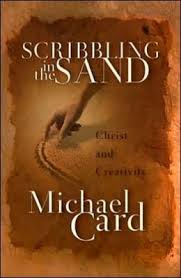 cribbling in the Sand: Christ and Creativity (IVP; $16.00.) This is one of my own favorites of his is and I hope you know about it as it is such a good read. I have reviewed Scribbling… elsewhere and we take it out to many of the places we go to display books as it is a core title in our section of books about the arts. It is, as is his style, mostly a Biblical study (drawing its allusive title to the story of Jesus writing in the dirt.) He offers good insight into the life of an artist and how the Biblical teaching on creativity and the very life of Jesus can influence those called to creative work. Nice!!
cribbling in the Sand: Christ and Creativity (IVP; $16.00.) This is one of my own favorites of his is and I hope you know about it as it is such a good read. I have reviewed Scribbling… elsewhere and we take it out to many of the places we go to display books as it is a core title in our section of books about the arts. It is, as is his style, mostly a Biblical study (drawing its allusive title to the story of Jesus writing in the dirt.) He offers good insight into the life of an artist and how the Biblical teaching on creativity and the very life of Jesus can influence those called to creative work. Nice!!
I especially like that, inspired by the 1966 “Letter to a Christian Artist” published in Art Needs No Justification by H.R. Rookmaaker, he invited a handful of influential authors and artists to pen a similar “Letter to a Young Christian Author” today which forms a very significant appendix. Mako Fujimura, Calvin Seerveld and others wrote original epistles for this volume, lovely and wise notes of encouragement and insight and guidance.
DISCOUNT
ANY ITEM MENTIONED
20% off
order here
takes you to the secure Hearts & Minds order form page
just tell us what you want
inquire here
if you have questions or need more information
just ask us what you want to know
Hearts & Minds 234 East Main Street Dallastown, PA 17313 717-246-3333
read@heartsandmindsbooks.com
